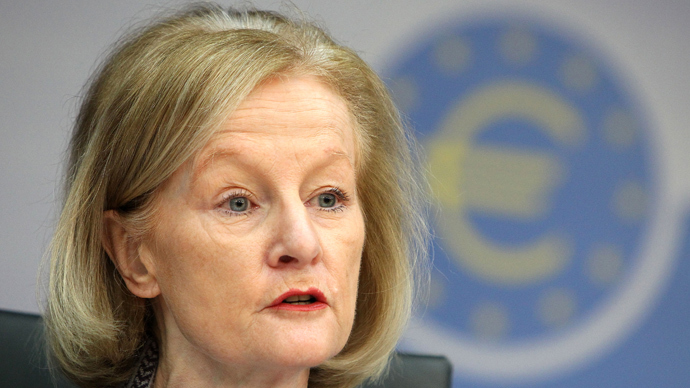Some European banks need to 'die in an orderly fashion’– new bank supervisor

Weak banks need to fail in order for the European Central Banks’ stress tests on lenders to be successful and credible, the new chair of the supervisory arm of the bank Daniele Nouy said. Only "good" banks with strong capital will survive.
“We have to accept that some banks have no future,” Nouy told the Financial Times (FT) in an interview published February 10, 2014. Nouy will serve a five-year term.
The single supervisory mechanism (SSM) is a regulatory body of the EBC that along with the London-based European Banking Authority, will conduct an asset quality review, and the health of 130 banks that hold about 80 percent of all bank assets in the 18-member currency bloc.
The mega-regulator will either close "non-viable" banks and attempt to re-capitalize weak, yet "viable" lending institutions by November 2014, when they take over as the region’s bank regulator and announce the results of the "stress tests".
“I hope that we will be able to resolve to put banks in run-off and not necessarily try to combine bad banks with good banks,” Nouy said.
“I do not have any idea of how many banks have to fail. What I know is that we want to have the highest level of quality,” she told FT.
The ECB will assess a lender’s key risks, including liquidity, leverage and funding, as well as asset quality and the ability of a banks’ balance sheet to resist stress scenarios.
“They may need resolution plans because they have to die in an orderly fashion; that’s very important for financial stability,” Nouy said.
The French national was appointed to chair the ECB Supervisory Board in December after a long stint at the Bank of France.
“We have to let some banks disappear in an orderly fashion, and not necessarily try to merge them with other institutions. We don’t want banks disappearing in a disorderly fashion, that’s the main point.”
Nouy’s message is in step with Mario Draghi, who has previously said some banks need to fail in order for the health check to be legitimate. The tests in 2011 were widely seen as unsuccessful because lenders hugely underestimated their risks.
“If they do have to fail, they have to fail. There’s no question about that,” Draghi said in October.
Eurozone banks may have a capital deficiency of as much as €50 billion, according to Davide Serra, chief executive of London-based Algebris, an investment firm that specializes in government and banking consulting. Serra told The Telegraph that Germany has one of “the worst banking systems in the world”, and also expects many banks in Portugal and Greece to be low on capital.
The banking union is largely seen as a main driver for economic recovery and expansion in Europe, as it will facilitate trillions of euro in cheap loans and help restore credit-lending in Europe’s financially-crippled south. However, as the stress tests approach, many banks are trying to keep balance sheets robust in to prepare for inspection.
When the London-based EBA conducted tests in 2011, a benchmark of 5 percent capital was set. Some analysts believe the ECB may require 6 percent.
Also in the interview Nouy said the ECB won’t be “shy” to exert its power, and she also discussed possible bonus caps for European bankers.














